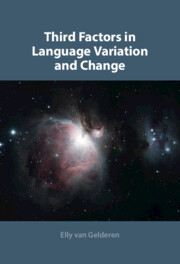Book contents
- Third Factors in Language Variation and Change
- Third Factors in Language Variation and Change
- Copyright page
- Contents
- Figures
- Tables
- Preface
- Abbreviations
- 1 The Shift towards a Minimal UG
- 2 Labeling in Language Change
- 3 Determinacy in Language Variation
- 4 Determinacy in Language Change
- 5 Labeling and Determinacy: Verb-Second and Expletives
- 6 Adjunct Incorporation and Avoiding Pair-Merge
- 7 Conclusion
- References
- Index
4 - Determinacy in Language Change
Published online by Cambridge University Press: 16 December 2021
- Third Factors in Language Variation and Change
- Third Factors in Language Variation and Change
- Copyright page
- Contents
- Figures
- Tables
- Preface
- Abbreviations
- 1 The Shift towards a Minimal UG
- 2 Labeling in Language Change
- 3 Determinacy in Language Variation
- 4 Determinacy in Language Change
- 5 Labeling and Determinacy: Verb-Second and Expletives
- 6 Adjunct Incorporation and Avoiding Pair-Merge
- 7 Conclusion
- References
- Index
Summary
Chapter 4 provides examples of reanalyses, rather than different choices, that are prompted by the Principle of Determinacy. The first change involves the reanalysis of a loosely adjoined phrase as a subject argument because a topicalized subject does not result in an optimal computation. The principle also accounts for changes involving copulas, both the change from demonstrative to copula and from topic to subject. Auxiliaries and quantifiers in English provide fertile ground to investigate determinacy, because these move from lower to higher heads and specifiers, respectively. It is shown that auxiliary movement indeed violates determinacy and that options exist to circumvent it, e.g. skipping T and reanalyzing as a higher functional head. Floating quantifiers do not violate determinacy because they first move as QPs and subsequent moves are of DPs.
- Type
- Chapter
- Information
- Third Factors in Language Variation and Change , pp. 87 - 122Publisher: Cambridge University PressPrint publication year: 2021

